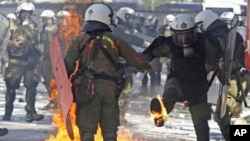Protesters and police have clashed outside the Greek parliament as a massive protest and general strike shut down Athens. Both public and private sector unions are backing the industrial action against the government’s plans to slash the salaries of public workers and raise taxes. The government says the measures are vital if it is to receive the next slice of bailout money.
An estimated 70,000 people marched Wednesday, protesting against the government’s latest round of austerity measures. A small number attempted to break into the building - launching stones and petrol bombs at police - who returned fire with tear gas.
This is the largest strike and protest Athens has seen since June. Steel worker Thanasis Protellis said they will not back down.
"This government must fall and all the parties that support these measures must fall with it,” he said.
Athens is frozen operationally. The 48-hour strike by public and private sector workers has seen flights grounded. In Piraeus, the port of Athens, the ferries are anchored and going nowhere.
Schools are closed, while banks and shops will stay shuttered until Friday at the earliest.
Ilias Iliopoulos, general secretary of ADEDY, the public workers’ union, said the austerity measures are crippling Greece.
“Normal workers are paying higher taxes, they’re getting lower salaries, lower pensions, resulting in the economy being literally destroyed,” he said. “This has led to 500,000 businesses shutting down, and this, in turn, to 1.2 million people unemployed who find it hard to live, let alone pay the state taxes.”
Not all Greek workers want to strike. Stefanos Troupakis, a stockbroker with Piraeus Bank, said, "It’s a very difficult environment to get your job done every day. It just makes simple things more difficult, so let alone having to face all the problems that we’re all facing. It just makes things worse.”
Politicians are voting on two bills, which would see 30,000 public workers put on reduced pay, taxes raised and pensions reduced further. It’s aimed at cutting the huge debt, now running at 162 percent of GDP.
To receive the next $11 billion of bailout money, Greece must satisfy the IMF, the EU and the European Central Bank - the so-called troika - that it can slash spending.
Political commentator Kostas Raptis said most Greeks believe the only way out is a default on the debt.
“Things get even worse by applying the troika rules. It’s a death spiral. Austerity makes the GDP contract. So how could Greece get out of this trap?” asked Raptis.
It’s a trap that Europe’s politicians fear could ensnare bigger economies like Italy and Spain. Analysts say the consequences of that would be far greater than the fallout from Greece.





![Riot police spray tear gas at demonstrators during clashes in Athens' Syntagma [Constitution] square, October 19, 2011.](https://gdb.voanews.com/6C1F366A-524A-4223-9BCF-29A324694A6B_w250_r0_s.jpg)